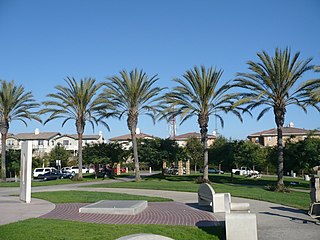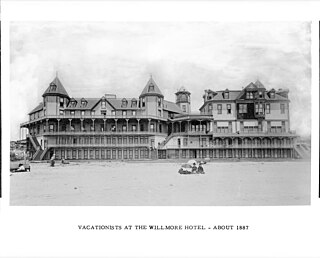
Mission San Gabriel Arcángel is a Californian mission and historic landmark in San Gabriel, California. It was founded by Spaniards of the Franciscan order on "The Feast of the Birth of Mary," September 8, 1771, as the fourth of what would become twenty-one Spanish missions in California. San Gabriel Arcángel was named after the Archangel Gabriel and often referred to as the "Godmother of the Pueblo of Los Angeles." The mission was built and run using what has been described as slave labor from nearby Tongva villages, such as Yaanga and was built on the site of the village of Toviscanga. When the nearby Pueblo de los Ángeles was built in 1781, the mission competed with the emerging pueblo for control of Indigenous labor.

Beverly Hills is a city located in Los Angeles County, California, United States. A notable and historic suburb of Los Angeles, it is located immediately southwest of the Hollywood Hills, approximately 12.2 miles (19.6 km) northwest of downtown Los Angeles. Beverly Hills' land area totals to 5.71 square miles (14.8 km2), and is entirely surrounded by the city of Los Angeles. According to the 2020 census, the city has a population of 32,701; marking a decrease of 1,408 from the 2010 census count of 34,109.

Long Beach is a city in Los Angeles County, California, United States. It is the 43rd-most populous city in the United States, with a population of 466,742 as of 2020. A charter city, Long Beach is the seventh-most populous city in California and the most populous city that is not a county seat.

Signal Hill is a city 2.2 sq mi (5.7 km2) in area in Los Angeles County, California. Located high on a hill, the city is an enclave completely surrounded by the city of Long Beach. Signal Hill was incorporated on April 22, 1924, roughly three years after oil was discovered there. As of the 2010 census, the city population was 11,016.

Laguna Beach is a city in Orange County, California, United States. Located in Southern California along the Pacific Ocean, this seaside resort city has a mild year-round climate, scenic coves, and environmental preservation efforts. The population in the 2020 census was 23,032.

The Pacific Electric Railway Company, nicknamed the Red Cars, was a privately owned mass transit system in Southern California consisting of electrically powered streetcars, interurban cars, and buses and was the largest electric railway system in the world in the 1920s. Organized around the city centers of Los Angeles and San Bernardino, it connected cities in Los Angeles County, Orange County, San Bernardino County and Riverside County.

The San Fernando Valley, known locally as the Valley, is an urbanized valley in Los Angeles County, California. Situated to the north of the Los Angeles Basin, it contains a large portion of the City of Los Angeles, as well as unincorporated areas and the incorporated cities of Burbank, Calabasas, Glendale, Hidden Hills, and San Fernando. The valley is well known for its iconic film studios such as Warner Bros. Studios and Walt Disney Studios. In addition, it is home to the Universal Studios Hollywood theme park.

Wilmington is a neighborhood in the South Bay and Harbor region of Los Angeles, California, covering 9.14 square miles (23.7 km2).

Terminal Island, historically known as Isla Raza de Buena Gente, is a largely artificial island located in Los Angeles County, California, between the neighborhoods of Wilmington and San Pedro in the city of Los Angeles, and the city of Long Beach. Terminal Island is roughly split between the Port of Los Angeles and Port of Long Beach. Land use on the island is entirely industrial and port-related except for Federal Correctional Institution, Terminal Island.

Beach Cities is a nickname for the coastal area of Los Angeles County comprising the oceanfront cities of Manhattan Beach, Hermosa Beach, and Redondo Beach, located on the south end of the Santa Monica Bay west and south of downtown Los Angeles, north of the Palos Verdes Peninsula on the Pacific Ocean in Southern California. Neighboring Torrance also shares a strip of beach property in the South Bay, but is generally excluded from the group.

Willow Street station is an at-grade light rail station on the A Line of the Los Angeles Metro Rail system. The station is located adjacent to Long Beach Boulevard its intersection with Willow Street, after which the station is named, in the Wrigley neighborhood of Long Beach, California.

Hobart Johnstone Whitley was a Canadian-American businessman and real estate developer. Whitley is best known for helping create the Hollywood subdivision in Los Angeles. He is among those known as the "Father of Hollywood."

Cahuenga Boulevard is a major boulevard of northern Los Angeles, California, US. The “Cahuenga” name is a Spanish, phonetic derivative with no actual Spanish language meaning that is attributed to the Tongva village of Kawengna, meaning "place of the mountain". It connects Sunset Boulevard in the heart of old Hollywood to the Hollywood Hills and North Hollywood in the San Fernando Valley.
Artesia Boulevard is a west-east thoroughfare in Los Angeles County and Orange County.

The Hollywood Roosevelt Hotel is a historic hotel located at 7000 Hollywood Boulevard in the Hollywood district of Los Angeles, California. It opened on May 15, 1927, and is the oldest continually operating hotel in Los Angeles.
Forest Lawn-Long Beach is a 38-acre mortuary and memorial garden in Long Beach, California, United States. The gardens were established as Sunnyside Memorial Gardens in 1921 by Cecil E. Bryan, Sr., an entrepreneur whose family operated the facility for three generations. Sunnyside was one of the first major cemeteries in Long Beach. Over the years it served the local area, but fell into disrepair by the 1970s. and was purchased in 1978 by Forest Lawn Memorial-Parks & Mortuaries. They renovated the facility, and renamed it Forest Lawn – Sunnyside in deference to its history—later changed to Forest Lawn – Long Beach to match their other properties.
John G. Montijo (1891–1929) was an American aircraft engineer and instructor.
The following is a timeline of the history of the city of Long Beach, California, USA.

William Erwin Willmore was an English-born American headmaster and the founder of a small colony named after him, Willmore City in 1876. This piece of land, roughly 4000 acres, partitioned from the former Los Cerritos ranchero, was bought by Jotham Bixby, who helped found what would initially become the city of Long Beach, California. Willmore City was initially incorporated as a neighbourhood of the city of Long Beach in 1886.















